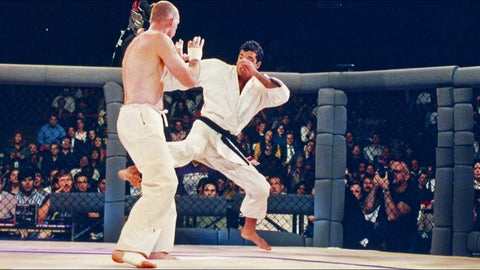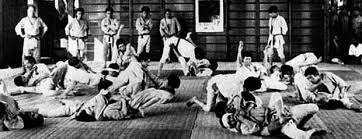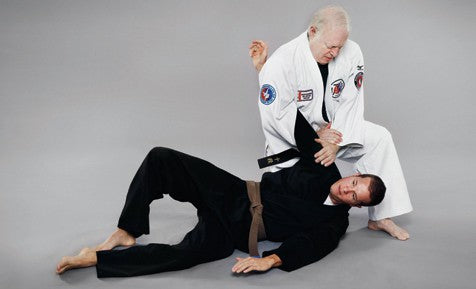
En Estados Unidos, desde los años 90, el arte que practico y enseño se llama Jiu-Jitsu brasileño o, a veces, Gracie Jiu-Jitsu. Quítate el gi y podría llamarse lucha, lucha por sumisión o lucha con nogi.
Algunos argumentarán que los chicos de Judo han estado haciendo más o menos lo mismo que nosotros, los chicos de BJJ, pero durante mucho más tiempo. Si bien estoy en parte de acuerdo, la mayoría de los clubes de Judo se centran mucho más en la práctica de pie y mucho menos en el suelo.

(Foto: Judo de la vieja escuela en Japón)
Cuando los Rorion y otros Gracies trajeron el arte a los EE. UU., ya había pequeños grupos de practicantes japoneses de Jujutsu aquí. En su mayor parte, estos grupos eran bastante pequeños y no ofrecían mucho en términos de combate de resistencia total. Muchas veces, enseñaban kata (formas prescritas), similar a lo que las escuelas modernas de BJJ podrían hacer en sus programas de autodefensa.
(Foto: George Kirby, uno de los primeros profesores de jujutsu japonés en los EE. UU., enlace al DVD )
Debido a que estos grupos de jujutsu japoneses ya estaban en los EE. UU., necesitábamos un nombre para diferenciarlos de sus homólogos brasileños, de ahí el nombre BJJ o Gracie Jiu-Jitsu. Después de ver a Royce en UFC 1 (en vivo por PPV en mi caso), quedó claro que el BJJ era muy diferente al Jujutsu japonés.
Durante mi primer viaje a Brasil me sorprendió saber que en su propio país no lo llaman BJJ, es simplemente Jiu-Jitsu. Mirando hacia atrás, tiene sentido. En Brasil continuaron lo que les enseñaron (por Mitsuyo Maeda y otros profesores japoneses). En aquellos primeros días parece que se prestaba mucha más atención al trabajo de campo, incluso en Japón.
(Foto: Entrevistando a la leyenda Terere en Brasil. Enlace al episodio. )
Eso me lleva a mi pregunta. El BJJ se ha extendido por todas partes en Estados Unidos. Al jujutsu japonés no le ha ido tan bien. Para mucha gente, Laicos y practicantes incondicionales, Jiu-Jitsu = BJJ. Cuando alguien dice “el actual campeón de UFC tiene un gran Jiu-Jitsu, nadie confunde eso con el estilo japonés. En mis conversaciones rara vez uso la B. Creo que es hora de dejarla. ¿Qué opinas? ¡Por favor, deja un comentario a continuación y házmelo saber!




26 comentarios
I have always just verbally called it jiu-jitsu. But when I write it, I will either put BJJ or GJJ depending on if I am talking about sport jiu-jitsu (BJJ) or Gracie Jiu-Jitsu self-defense (GJJ).
If this would be a State affair, a commission of inquiry would determine that the real name is Kosen Judo (for those who don’t know what is this, find out in Google). At least, that’s what ALL the Gracies showed in the 90s. However, with the emergence of names like Eddie Bravo and John Danaher, there is now more ground to talk about American Jiu Jitsu rather than Brazilian Jiu Jitsu at the time. Greetings.
The B may have lost its relevance in relation to BJJ but the JJ has not!
I believe that BJJ should maintain it’s present name.
There is a notable difference between what I refer to as the traditionally based jujutsu and BJJ and all of it’s derivatives. The public should be made aware of this difference starting with the name. That is why there are different Ryu’s. Each has a unique prospective or approach “if you will” to Jujutsu. However, Jujutsu is a Japanese art (as per the name itself implies) and no matter how different the approach (in general) these Gendai Ryu’s attempt to maintain some sense of the arts origins. BJJ has for the most part (at least in the US) deemphasizes this. Not a bad thing, but the public should not be led to believe that BJJ is the prototype for Jujutsu. It should be clear from the onset that there is a difference, in technique, approach, philosophy and spiritual underpinnings. The JJ is only the historical phoenix from which BJJ arose.
It is a different approach to Japanese jiu jitsu and helio is the cause of that approach. Go do more research on how Gracie jiu jitsu aka brazillian jiu jitsu, before you write about name changes. Where were the “american jiu jitsu” guys when ufc came out? Royce came and proved that his fathers way of jiu jitsu is much more effective.
We call a Ferrari a Ferrari, not a Ferrari car. Each car’s name distinguishes it from the rest. Brazilian jiu jitsu is different in approach to its Japanese forerunner
I’m all for it. I’ll only ever use “Brazilian” as a qualifier if I need to clarify the specific style if questioned. Otherwise it is just “Jiu Jitsu”.
People saying it needs to be differentiated from “Japanese Ju Jutsu” forget two things: Every style/school (ryu) of Ju Jutsu is very different from each other, so there is no “standard” Japanese Ju Jutsu. Second, true Japanese Ju Jutsu is all but extinct – even in Japan. Everyone claiming to train or teach it outside of very few places are teaching Judo/Karate/insert-other-art-here hybrids that they have named something-ryu Ju Jutsu.
There is no reason that every other “ryu” of Ju Jutsu/Jiu Jitsu can be lumped in together but Brazilian/Gracie Jiu Jitsu must always have the clarifier, other than for marketing. And for marketing, all the other styles would do the same anyway.
In other words, I train Jiu Jitsu. If anyone needs more detail I will say I train Brazilian Jiu Jitsu and submission grappling (along with Judo but that is irrelevant here).